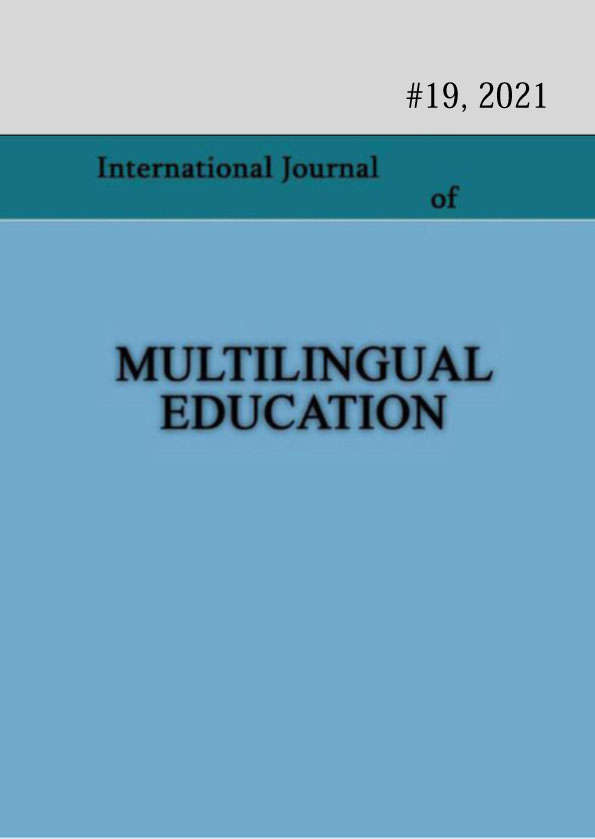The second language acquisition: problems and challenges for Georgian Deaf community
Keywords:
Sign languages, Georgian sign language – GESL, Second language acquisition, Multilingual education, Inclusive studiesAbstract
As stated in the title, the paper is devoted to the issue of second language acquisition by Deaf people in Georgia, describing the current situation and the challenges. There are about 2500 Deaf and hard of hearing residents in Georgia. Being the linguistic minority in the country, these people communicate with each-other in the Georgian Sign Language – GESL. The second native language for local Deaf and hard of hearing people is the Georgian spoken language – the State language. In many countries Deaf people are bilingual, while it is hard to consider the local Deaf and hard of hearing people bilingual, as the knowledge of spoken Georgian on the level of a native language among the Deaf residents is not observed. Unfortunately in Georgia there are no studies concerning the second language acquisition for Deaf and hard of hearing people. The main problems are the agrammatism in written communication on the state language and the ignorance of deferent hierarchical levels of spoken Georgian. This short paper offers the key issues for the plan of strategy of spoken Georgian acquisition for local Deaf and hard of hearing residents.
References
Bybee, J. (2003). Cognitive Processes in Grammaticalization. 145-167; In: Cognitive and Functional Approaches to Language Structure. Vol. 2 of The New Psychology of Language. Ed. Michael Tomasello. Mahwah, NJ: Lawrence Erlbaum.
Charrow, V. R., & Fletcher, J. D. (1974). as the second language of deaf children. July 1974. Developmental Psychology 10(4):463-470; DOI: 10.1037/h0036711. Access September 27, 28,
2021
Humphries, T., Kushalnagar, P., Mathur, G., & Rathmann, Ch. (2014). Ensuring language acquisition for deaf children: What linguists can do. June 2014. Language 90 (2):31-52 DOI: 10.1353/lan.2014.0036. Project: Language Rights of Deaf Children. Access September 27, 28, 2021
Hopper, P. & Traugott, E. C. (2003). Grammaticalization. 2nd ed. Cambridge: Cambridge University Press.
Janzen, T. (2012). Lexicalization and Grammaticalization. 816-841. In: Sign Language – An International Handbook. Eds. Roland Pfau, Markus Steinbach and Bencie Woll. Berlin, Boston: De Gruyter Mouton. doi: https://doi.org/10.1515/9783110261325
Makharoblidze, T. (2015). kartuli jest’uri enis leqsik’oni [Georgian Sign Language Dictionary]. Ilia State University; Shota Rustaveli National Scientific Foundation. Tbilisi. ISBN 978-9941-16- 225-5 1368 pp.
Makharoblidze, T. (2012), kartuli jest’uri ena [Georgian Sign Language[. Ministry of Education and Science, USAID, Save Children International. Tbilisi. 2012 615pp.
Makharoblidze, T. (2014), E-learning in inclusive education. International conference on e-learning - new agenda. GIZ, MOE, VIT. 2014 25-26 Nov.
Makharoblidze, T. (2015). Agrammatism in Georgian. (Theoretical Discussion). International Conference „ Speech and Language Therapy: Contemporary Aapproaches and Perspectives in Georgia. Ilia State University. Tbilisi. 2 Nov.
Makharoblidze, T. (2014). The Identity Issues of Georgian DHH. International Conference “The European values and identities" TSU, Georgia Pro-Europa, French University” TSU. pp. 229- 234; 426-420
Makharoblidze, T. (2013). The Georgian Dactyl Alphabet. Disability studies Quarterly. Vol. 33, No.3 2013 http://dsq-sds.org/article/view/3318
The Linguistics of Sign Languages, (2016). An introduction. Ed. By Anne Baker, Beppie van den Bogaerde, Roland Pfau, Trude Schermer. John Benjamins Publishing Company.
Published
How to Cite
Issue
Section
License
Copyright (c) 2021 Tamar Makharoblidze

This work is licensed under a Creative Commons Attribution-NonCommercial 4.0 International License.
Copyright (c) - Authors who publish with this journal agree to the following terms: Authors retain copyright and grant the journal the right of first publication with the work simultaneously licensed under a Creative Commons Attribution-Noncommercial 4.0 International License, which allows others to share the work with an acknowledgement of the work's authorship and initial publication in this journal. Authors are permitted and encouraged to post their work online (e.g., in institutional repositories or on their personal website) prior to and during the submission process, as it can lead to productive exchanges, as well as earlier and greater citation of published work (see The Effect of Open Access). Authors may enter into separate, additional contractual arrangements for the non-exclusive distribution of the journal's published version of the work (e.g., post it to a repository or publish it in a book), with an acknowledgement of its initial publication in this journal.

